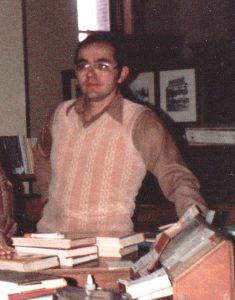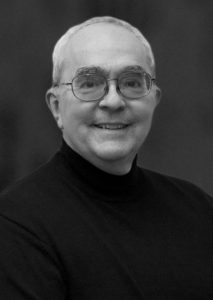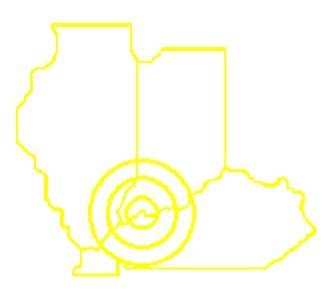Don Baker

Don Baker, 1970s
Remarks by the former director of Willard Library as read at the 40th Anniversary Celebration of TSGS, April 2018
I was hired as Head Librarian at Willard in January, 1976. I had a freshly minted masters degree in library science, but what interested the Board most was my master’s in history and my experience researching and editing Indiana and local history. Two years earlier, the Board had hired a library consultant to advise them on how they could give Willard a special role in the community, one not already covered by the “other” public library and the two universities. He told them that genealogy was the coming field and would mesh well with Willard’s existing local history collections. The Board became fully committed to that new area of service.
At that time, the genealogy presence in the community was largely limited to Kay Lant’s classes in family research (which I took and benefitted from immensely) and the DAR Room at the old Central Library, which was staffed by volunteers and only open to researchers one afternoon a week. Available resources included cemetery lists published by individuals and the county histories being reprinted by Laddie Warren’s Unigraphic Press.
Due to perpetually tight finances, from the beginning Willard’s second floor had been relegated to closed storage for non-circulating materials. That area was now designated for the new Regional and Family History Center, but limited staffing continued to mean public access remained sporadic at best. The Board told me, “we have confidence you’ll learn how to run a library. Meanwhile, let the adult and children’s services run themselves and get that second floor open!”
Here he goes into how he built community support by speaking with groups such as Kiwanis, Rotary and Optimist, raising capital funds to install a ramp and the elevator, gaining bi-partisan support from local and state politicians; it helped that Lt. Governor and then Governor Robert Orr was on the board of directors for Willard Library.
He continues:
Meanwhile, we needed someone to manage the day-to-day operations of the Family History Center. I was very lucky to be able to hire Joan Elliott, later Joan Elliott Parker, as Special Collections Librarian. She got collections organized and catalogued and public service upstairs operating with the friendly and personal approach that has always been Willard’s hallmark.
In 1986, Joan wrote the “Special Collections” essay for the Friends of Willard Library’s commemorative book, “Where There’s a Willard.” Here’s how she described the Library’s relationship with the Tri-State Genealogical Society. I could not have said it better:
Joan wrote:
“The library began to draw “so many genealogists that efforts were made to accommodate this new interest. One step which was taken was to open the genealogy room one evening a week. This move was popular and successful from the start. It allowed time outside the normal working hours for many persons to pursue their research. It also provided a time for genealogists to gather together.”
She continues:
“There had been expressions of interest by many area genealogists in forming a genealogy society. Now, with a place to meet, plans got underway. Discussions began as early as March, 1977, and after a couple of exploratory meetings held at the invitation of the Library, the Tri-State Genealogical Society was officially begun. A strong and active organization from the very beginning, the Society boasted over 500 members in 1983.”
“This group has been a steady helpmate to Willard’s genealogy collection, contributing books, magazines, ideas, money, and general support. It played a major role in the [lib

rary’s] Regional and Family History Center.” End quote. Baker continues:
I have many happy memories of working with the Tri-State Genealogical Society and the wonderful people who dedicated themselves to its growth and flourishing—people like Bettie Ann and Michael Cook, Edna Kasper, and so many others. You have my best wishes for another forty years as you adapt to the many changes that have occurred in the way genealogical research is done.
Return to ABOUT US

